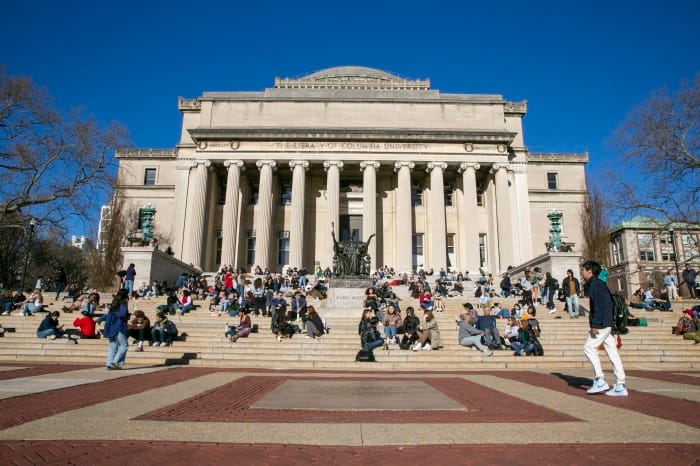March 24 2025
Investors cheer narrower tariffs; Universities court Trump; Women shun marriage; Trump eyes Greenland; Israel widens Gaza push; NCAA top seeds advance

Investors Cheer Scaled-Back U.S. Tariff Strategy
Universities Seek Trump’s Favor Amid Funding Fears
More American Women Opt Out of Marriage
Trump Officials Visit Greenland Amid Strategic Talks
Israel Expands Gaza Operations as Talks Falter
All No. 1 Seeds Reach NCAA Sweet 16
GET THE CITIZEN JOURNAL APP - FREE!

FLASH…George Foreman dead at 76…
1. Investors Cheer Scaled-Back U.S. Tariff Strategy
A. The White House is narrowing its approach to tariffs set to take effect on April 2, likely omitting a set of industry-specific tariffs while applying reciprocal levies on a targeted set of nations that account for the bulk of foreign trade with the U.S. President Trump has declared his April 2 deadline to be “Liberation Day” for the U.S., when he will put in place what is called reciprocal tariffs that seek to equalize U.S. tariffs with the duties charged by trading partners, as well as tariffs on sectors like automobiles, pharmaceuticals and semiconductors he repeatedly said would be enacted on that day. Those sector-specific tariffs, however, are now not likely to be announced on April 2, said an administration official, who said the White House is still planning to unveil the reciprocal -tariff action on that day, though planning remains fluid. The fate of the sectoral tariffs, as well as tariffs on Canada and Mexico that Trump said were justified by fentanyl trafficking, remains uncertain. The White House didn’t respond to requests for comment on if or when any of those tariffs are still planned to go into effect.
B. Investors are welcoming the latest pivot on tariffs, with the U.S. set to limit the range of import levies it introduces next week. U.S. stock benchmarks look poised to start the week solidly higher, following broad gains in Europe and Asia. The S&P 500 inched up last week, snapping a four-week losing streak partly driven by uncertainty caused by President Trump’s trade policy. Trump had said he would impose tariffs to match those aimed at the U.S. by trading partners, plus duties on imports in sectors such as autos and pharma, starting on April 2. But the planned reciprocal action looks set to be more targeted than originally thought, The Wall Street Journal reported. The administration has narrowed its focus to about 15% of nations running persistent trade imbalances with the U.S.—dubbed the “dirty 15” by Treasury Secretary Scott Bessent. Meanwhile, the sectoral tariffs are now unlikely to be announced on April 2.
Source: WSJ
2. Universities Seek Trump’s Favor Amid Funding Fears
When University of Michigan President Santa Ono sat down for breakfast earlier this month with a group of lawmakers from his home state, the message was clear: The school was ready to play ball with Trump’s Washington. It was time for universities to “wake up” and start addressing the reasons why they have lost so much trust, Ono told the bipartisan group in a hotel conference room near the Capitol, according to people with knowledge of the meeting. Ono added that universities should listen to their most “vocal critics.” University leaders, pinned between liberal faculty and the Trump administration, are quietly trying to make friends in Washington amid widespread concerns about research budgets, student aid and the White House’s quest to push academia to the right. During his election campaign, President Trump vowed “to reclaim our once great educational institutions from the radical Left,” and he has moved quickly to target diversity, equity and inclusion programs, alleged antisemitism and anything perceived as “woke.” He has threatened to pull funding from universities that don’t comply. Columbia University, which came under scrutiny for its handling of pro-Palestinian protests last year, gave in on Friday to a far-reaching list of Trump’s demands after he revoked $400 million in federal funding. Other schools closely watched the days of tense negotiations. Behind the scenes, Columbia officials have had a presence in D.C. in recent weeks, too, often asking lawmakers how to restore confidence in the university, according to people familiar with the meetings.
Source: WSJ
3. More American Women Opt Out of Marriage
The share of women ages 18 to 40 who are single—that is, neither married nor cohabitating with a partner—was 51.4% in 2023, according to an analysis of census data by the Aspen Economic Strategy Group, up from 41.8% in 2000. These numbers don’t specify whether women are looking for love or swearing it off, but more-nuanced surveys show that single women appear less interested in getting married now than they used to be. They also seem less keen on getting hitched than their male peers. Marriage rates for both men and women are in decline, in part owing to less pressure to pair off and higher expectations for a would-be match. “Dating apps make people feel like there might always be a better option,” said Melissa Kearney, an economist at the University of Maryland. “They view looking for a marriage partner the same way that you view looking for a job candidate.” But men seem more satisfied with their options than women. A 2023 AEI survey of college-educated women found that half blamed their singlehood largely on an inability to find someone who meets their expectations. Less than a quarter of single men said the same.
Source: WSJ
4. Trump Officials Visit Greenland Amid Strategic Talks
Several senior Trump administration officials are set to travel to Greenland next week as the Arctic island coveted by the US president is in talks to form a new government and holds local elections. Mike Waltz, the US national security adviser, Usha Vance, wife of vice-president JD Vance, and the army and energy secretaries will travel to Greenland in what is being billed as “a private visit” from Thursday until Saturday, according to people with knowledge of the trip. A source familiar with the visit confirmed that Waltz and energy secretary Chris Wright would visit Pituffik Space Base, the US military installation on Greenland. Danish and Greenlandic officials have said they are open to an increased US presence on the island, but not to it being taken over.
Source: FT
5. Israel Expands Gaza Operations as Talks Falter
Israel’s military is expanding its ground operations across the Gaza Strip as talks to stop the fighting and release more hostages have stalled and the death toll in the enclave surpasses 50,000. Israeli troops pressed into the northern Gaza border town of Beit Hanoun on Saturday to lay the groundwork for expanding Israel’s security buffer, a several-hundred-meter-wide zone the military has carved out within Gaza that spans its border with Israel. The military said it is now operating in patches to expand its footprint and uproot Hamas infrastructure across Gaza, from Beit Hanoun and Beit Lahiya in the north to the Netzarim Corridor bisecting the enclave’s middle and Rafah on the Egyptian border in the south. Evacuation orders were issued Sunday for Palestinians to flee expanding operations in Rafah, as Israel said its forces had completed encircling the city’s Tel al-Sultan neighborhood.
Source: WSJ
6. All No. 1 Seeds Reach NCAA Sweet 16
All four No. 1 seeds have advanced to the Sweet 16, using notably different ways to get there. Saturday, Auburn started slow (again) before blowing past Creighton in the second half, and Houston started fast before fending off a dangerous Gonzaga squad. No. 4 Maryland stole the show Sunday with a buzzer-beating thriller to stun No. 12 Colorado State after the Rams had led for over half the game. Later, Arizona erased a double-digit first-half deficit to defeat Oregon and advance to next weekend’s Sweet 16. Earlier Sunday, No. 1 Florida ended UConn’s three-peat hopes in a hard-fought, well-played contest, and Duke was the last No. 1 to advance out of the second round, crushing Baylor with a dominant performance.
Source: NYT
March 24, 1943: WW2 homing pigeon hero hatched
G.I. Joe, one of the most decorated homing pigeons in military history, is hatched. During WWII, he flew 20 miles in 20 minutes in the nick of time to save a battalion from being bombed—credited with saving some 1,000 British troops.
SUBSCRIBE ONLINE TO GET THE US CITIZEN JOURNAL IN YOUR INBOX - FREE!
See the Ad Astra Podcast! Released on Apple and Spotify around 10a CST.
Sponsors (click me!)












Sources
- https://www.wsj.com/politics/policy/trump-tariff-reciprocal-deadline-industrial-delay-97508838?mod=hp_lead_pos1
- https://www.wsj.com/livecoverage/stock-market-today-dow-nasdaq-sp500-03-24-2025?mod=hp_lead_pos2
- https://www.wsj.com/us-news/education/universities-trump-lobbyists-funding-washington-a2e5c77a?mod=hp_lead_pos7
- https://www.wsj.com/lifestyle/relationships/american-women-are-giving-up-on-marriage-54840971?mod=Searchresults_pos1&page=1
- https://www.ft.com/content/5d4d990a-0ffe-4d57-a035-5e6d5862049f
- https://www.wsj.com/world/middle-east/israel-expands-gaza-ground-operations-in-bid-to-squeeze-hamas-6ea21869?mod=world_lead_story
- https://www.nytimes.com/athletic/6223176/2025/03/23/march-madness-2025-day-4-takeaways/
